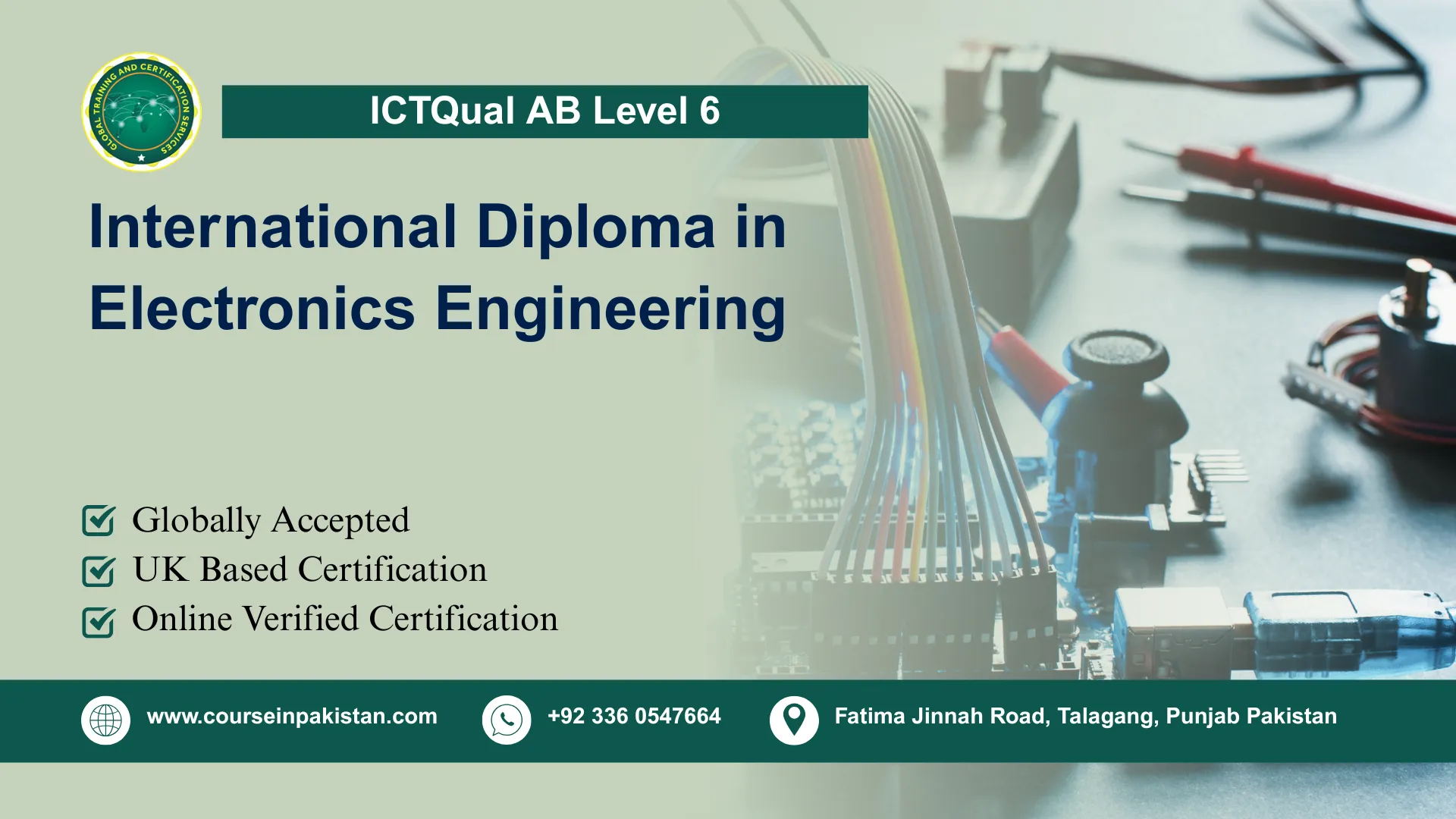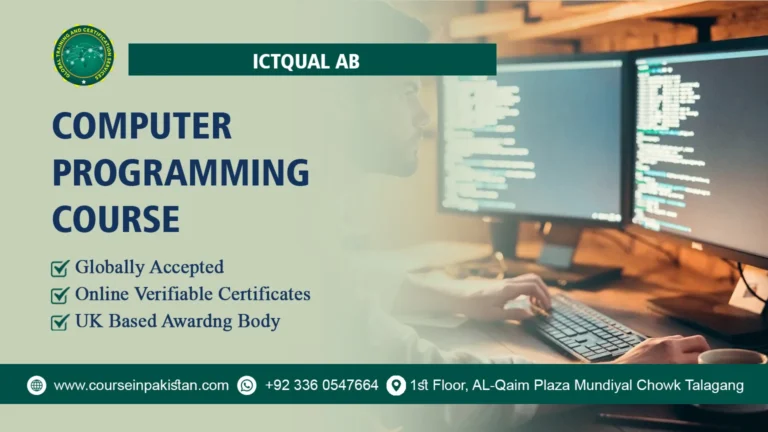
Through this diploma, participants will also develop critical problem-solving, analytical, and technical communication skills essential for success in electronics engineering. Graduates will be well-equipped to design, implement, and optimize electronic systems, and contribute effectively to innovative projects in electronics, telecommunications, automation, and embedded systems. The course is ideal for those aiming to take on leadership, research, or specialized technical roles in the electronics sector.
Course Introduction
The ICTQual AB Level 6 International Diploma in Electronics Engineering is designed for professionals and aspiring engineers seeking advanced knowledge and practical expertise in the field of electronics. This comprehensive program covers the core principles of electronics engineering, including circuit design, digital and analog systems, microelectronics, communication technologies, and control systems. Learners will gain hands-on experience with modern engineering tools, software simulations, and laboratory techniques, preparing them to tackle complex engineering challenges in a variety of industries.
Course Overview
The ICTQual AB Level 6 International Diploma in Electronics Engineering provides an in-depth understanding of advanced electronics concepts, including digital and analog circuit design, microprocessor and microcontroller systems, power electronics, communication systems, and embedded systems. The program combines theoretical foundations with practical laboratory work, software simulation, and project-based learning, enabling learners to develop practical solutions and innovations for modern electronic engineering challenges.
Key Highlights of the Course:
- Gain comprehensive knowledge of advanced electronics engineering principles
- Hands-on laboratory sessions and simulation-based learning for practical experience
- Learn to design, analyze, and optimize electronic systems and circuits
- Develop skills in communication systems, embedded systems, and control technologies
- Prepare for professional and leadership roles in electronics, automation, and telecommunications
Course Benefits
1. Career Advancement
- Access to senior and specialized roles in electronics engineering, automation, and telecommunications
- Enhance professional credibility and employability in international markets
2. Practical Skill Development
- Hands-on experience with modern electronic systems, tools, and simulation software
- Ability to design, test, and troubleshoot electronic circuits and systems
3. Industry-Recognized Qualification
- Internationally accredited and verifiable diploma
- Opens doors to global opportunities in electronics and engineering sectors
4. Technical and Analytical Expertise
- Develop critical thinking, problem-solving, and technical decision-making skills
- Learn to innovate and implement effective solutions for complex electronics challenges
5. Leadership and Professional Growth
- Prepare for management, project leadership, and technical supervision roles
- Develop communication, project planning, and teamwork skills essential for engineers
Course Study Units
This qualification, the ICTQual AB Level 6 International Diploma in Electronics Engineering, consists of 36 mandatory units.
Year 1 – Foundation in Electronics Engineering
- Principles of Electrical and Electronics Engineering
- Introduction to Circuit Theory
- Digital and Analogue Electronics Fundamentals
- Electronic Components and Devices
- Fundamentals of Signal Processing
- Introduction to Microcontrollers and Embedded Systems
- Health, Safety, and Environmental Awareness
- Electrical Measurement and Instrumentation
- Laboratory Techniques in Electronics
- Technical Report Writing
- Introduction to Simulation and Design Software
- Basics of Power Electronics
Year 2 – Intermediate Electronics Engineering
- Advanced Circuit Design and Analysis
- Embedded System Programming
- Communication Systems Fundamentals
- Sensors, Transducers, and Instrumentation
- Power Electronics and Motor Control
- Microprocessor Architecture and Applications
- Process Control and Automation in Electronics
- Data Acquisition and Signal Conditioning
- Project Planning and Technical Communication
- Quality Control and Assurance in Electronics Systems
- Advanced Laboratory Techniques
- Electronics Standards, Safety, and Compliance
Year 3 – Advanced Electronics Engineering
- Advanced Embedded Systems and IoT Applications
- Robotics and Automation Systems
- Advanced Signal Processing Techniques
- Wireless and Telecommunication Systems
- Electronic System Design and Optimisation
- Power Systems and Renewable Integration
- Risk Assessment and Safety in Electronics Projects
- Advanced Laboratory Experiments and Testing
- Supply Chain and Logistics in Electronics Industry
- Capstone Project in Electronics Engineering
- Professional Development and Leadership in Engineering
- Strategic Decision-Making in Electronics Projects
Learning Outcomes
Year 1 – Foundation in Electronics Engineering
1. Principles of Electrical and Electronics Engineering
- Understand the fundamentals of electrical and electronics engineering principles
- Describe key concepts in electricity, circuits, and electronics systems
- Identify applications of electronics engineering in real-world scenarios
2. Introduction to Circuit Theory
- Analyze basic electrical circuits using Ohm’s and Kirchhoff’s laws
- Understand series and parallel circuit behavior
- Apply circuit theorems to solve electrical network problems
3. Digital and Analogue Electronics Fundamentals
- Understand the differences between digital and analogue systems
- Analyze basic logic gates, flip-flops, and analogue circuits
- Design simple digital and analogue circuits for practical applications
4. Electronic Components and Devices
- Identify and describe functions of electronic components
- Apply knowledge of resistors, capacitors, diodes, transistors, and ICs in circuits
- Understand component characteristics and specifications
5. Fundamentals of Signal Processing
- Understand basic signal processing concepts and techniques
- Analyze analogue and digital signals
- Apply filtering, modulation, and transformation techniques to signals
6. Introduction to Microcontrollers and Embedded Systems
- Understand microcontroller architecture and applications
- Program basic embedded systems for simple tasks
- Integrate microcontrollers into electronics projects
7. Health, Safety, and Environmental Awareness
- Apply health and safety standards in electronics laboratories
- Conduct risk assessments and implement mitigation strategies
- Understand environmental impacts of electronics engineering
8. Electrical Measurement and Instrumentation
- Use instruments to measure voltage, current, resistance, and power
- Interpret measurement data for system evaluation
- Maintain and calibrate instrumentation equipment
9. Laboratory Techniques in Electronics
- Conduct laboratory experiments safely and accurately
- Apply standard techniques for circuit testing and troubleshooting
- Record, analyze, and present experimental results
10. Technical Report Writing
- Prepare structured, professional technical reports
- Present data and findings clearly using tables, charts, and diagrams
- Communicate technical information effectively to stakeholders
11. Introduction to Simulation and Design Software
- Use software for circuit simulation and design
- Analyze simulation results to improve circuit performance
- Model basic electronic systems using simulation tools
12. Basics of Power Electronics
- Understand power electronics principles and devices
- Analyze simple power conversion circuits
- Identify applications of power electronics in industrial and consumer systems
Year 2 – Intermediate Electronics Engineering
13. Advanced Circuit Design and Analysis
- Design complex analogue and digital circuits
- Analyze circuit performance and optimize designs
- Apply simulation and testing to validate circuits
14. Embedded System Programming
- Develop software for embedded systems using appropriate programming languages
- Integrate hardware and software for functional systems
- Debug and optimize embedded applications
15. Communication Systems Fundamentals
- Understand principles of communication systems and networks
- Analyze modulation and transmission techniques
- Apply knowledge to design basic communication circuits
16. Sensors, Transducers, and Instrumentation
- Understand the working principles of sensors and transducers
- Implement instrumentation systems for measurement and control
- Integrate sensors into electronics projects for data acquisition
17. Power Electronics and Motor Control
- Design and analyze power electronics circuits for motor control
- Understand drive systems and control strategies
- Apply safety and efficiency practices in power electronics applications
18. Microprocessor Architecture and Applications
- Understand microprocessor structure and operation
- Design applications based on microprocessor systems
- Program and interface microprocessors with peripheral devices
19. Process Control and Automation in Electronics
- Implement control strategies for electronic systems
- Apply automation techniques to optimize performance
- Use PLCs and other control devices for system management
20. Data Acquisition and Signal Conditioning
- Collect and process data from sensors and instruments
- Apply signal conditioning techniques to enhance data quality
- Analyze and interpret acquired data for decision-making
21. Project Planning and Technical Communication
- Plan electronic engineering projects with clear objectives and timelines
- Document technical processes and communicate effectively with teams
- Manage resources and coordinate tasks to meet project goals
22. Quality Control and Assurance in Electronics Systems
- Apply quality control principles to electronic manufacturing and design
- Conduct inspections and testing for compliance
- Implement quality assurance procedures in projects
23. Advanced Laboratory Techniques
- Conduct complex experiments using advanced laboratory tools
- Test and troubleshoot circuits under various conditions
- Record, analyze, and report results with accuracy
24. Electronics Standards, Safety, and Compliance
- Understand and apply industry standards in electronics engineering
- Implement safety and compliance measures in projects
- Assess legal and regulatory requirements for electronic systems
Year 3 – Advanced Electronics Engineering
25. Advanced Embedded Systems and IoT Applications
- Design and develop advanced embedded systems and IoT devices
- Integrate sensors, actuators, and communication modules
- Optimize system performance for real-world applications
26. Robotics and Automation Systems
- Understand principles of robotics and automated systems
- Design and implement control algorithms for robots
- Apply robotics solutions in industrial and research applications
27. Advanced Signal Processing Techniques
- Apply advanced filtering, modulation, and analysis methods
- Process and interpret complex digital and analogue signals
- Use signal processing tools for engineering applications
28. Wireless and Telecommunication Systems
- Understand wireless communication principles and protocols
- Design and analyze wireless systems for data transmission
- Integrate telecommunication technologies into engineering projects
29. Electronic System Design and Optimisation
- Plan and design complete electronic systems
- Optimize system performance, efficiency, and reliability
- Validate designs through testing and simulation
30. Power Systems and Renewable Integration
- Understand power systems and renewable energy applications
- Integrate renewable sources into electronics and control systems
- Analyze system performance under hybrid energy configurations
31. Risk Assessment and Safety in Electronics Projects
- Conduct risk assessments for electronics engineering projects
- Implement safety protocols to mitigate hazards
- Ensure compliance with health, safety, and environmental standards
32. Advanced Laboratory Experiments and Testing
- Perform high-level experiments with complex electronic systems
- Analyze and interpret experimental results for optimization
- Apply testing methods to validate system performance
33. Supply Chain and Logistics in Electronics Industry
- Understand supply chain management and logistics in electronics production
- Optimize procurement, storage, and distribution processes
- Apply best practices for efficiency and cost-effectiveness
34. Capstone Project in Electronics Engineering
- Plan, execute, and present a comprehensive electronics project
- Apply theoretical knowledge and practical skills to solve real-world challenges
- Produce professional reports and presentations of project outcomes
35. Professional Development and Leadership in Engineering
- Develop leadership, teamwork, and communication skills
- Understand professional ethics and industry standards
- Plan career development in electronics engineering and related fields
36. Strategic Decision-Making in Electronics Projects
- Apply strategic frameworks to complex engineering problems
- Evaluate technical, financial, and environmental factors
- Make informed decisions to optimize electronic project outcomes
Who is This Course For?
The ideal learner for this course is someone who:
- Has a strong interest in electronics engineering, embedded systems, and modern technology
- Seeks to advance their career in electronics, automation, telecommunications, or robotics
- Wants to develop practical skills in circuit design, signal processing, and IoT applications
- Desires to gain leadership, project management, and technical decision-making abilities
- Is motivated to apply innovative solutions in engineering projects and industrial applications
Future Progression
Graduates of this course can pursue:
- Senior and specialized roles in electronics engineering, automation, robotics, and telecommunication systems
- Positions such as Electronics Engineer, Embedded Systems Developer, or Automation Specialist
- Opportunities in project management, technical consultancy, and system optimization
- Advanced roles in research, development, and innovation for electronics and IoT technologies
- Career paths in design, testing, and integration of electronic and embedded systems
Academic Pathways:
- Learners completing this diploma may continue to:
- programs in Electronics Engineering, Embedded Systems, Robotics, or Telecommunications
- Professional certifications in IoT, Robotics, Power Electronics, or Automation Systems
- Specialized diplomas in Advanced Circuit Design, Signal Processing, or Industrial Electronics
- Research-based programs or PhD studies in electronics, IoT applications, and emerging technologies
Conclusion
The ICTQual AB Level 6 International Diploma in Electronics Engineering equips learners with advanced theoretical knowledge and practical skills essential for success in modern electronics. Graduates emerge as competent professionals capable of designing, testing, and optimizing complex electronic systems, integrating embedded and IoT technologies, and leading projects in industrial and research settings. This internationally recognized qualification enhances employability, promotes career growth, and empowers learners to contribute to innovation and technological advancement in the electronics sector.




